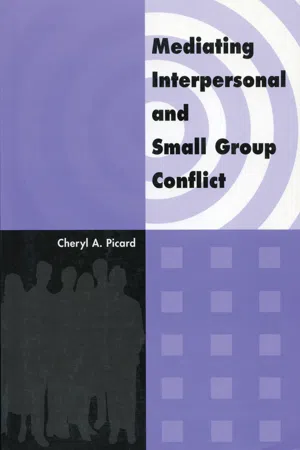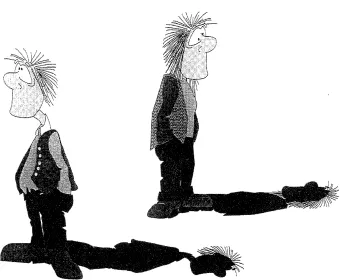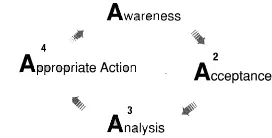
- 161 pages
- English
- ePUB (mobile friendly)
- Available on iOS & Android
eBook - ePub
Mediating Interpersonal and Small Group Conflict
About this book
This is a guide to the theory and practice of mediation. It sets out a systematic approach to the use of mediation and to assuming the role of mediator. This book will be one of value to individuals interested in becoming mediators, to parties in conflict considering recourse to mediation to resolve issues, to students studying mediation as a dispute resolution alternative, to professionals who use mediation techniques in their day-to-day work, and to practising mediators who wish to expand and update their skills.
Tools to learn more effectively

Saving Books

Keyword Search

Annotating Text

Listen to it instead
Information
2
The Practice
Chapter 3:
Conflict

Conflict is something that many people try to avoid or respond to with a “knee-jerk” reaction. Both of these responses result in negative emotions, ineffective solutions, and unresolved issues. Conflict theory is based on the premise that conflict can be constructive and healthy. It can improve group cohesiveness, stimulate innovations, and encourage the search for better solutions.
Understanding Conflict
Conflict is a fact of life. We see examples of it every day ranging from minor disagreements between individuals to political disagreements that have escalated into wars. Conflict can also be a mental struggle within ourselves generated from personal needs, desires, temptations, or from our needs and values coming into opposition with those of others.
Conflict, if constructively managed, can contribute to the well-being of individuals and groups.
If conflict is handled badly, it can lead to mistrust, anxiety, and dissatisfaction with oneself and with others.
A central concept in conflict management is that conflict does not have to be destructive or dysfunctional. In fact, conflict is healthy and can be productive. Poorly managed conflicts can destroy relationships, families, and communities. If managed skillfully and creatively, conflict can bring increased benefits for everyone. It can stimulate interest, improve communication, increase productivity, and bring about social change.
Conflict can be useful in bringing about positive change and growth in individuals, organizations, and communities. In fact, suppressing conflict can be more costly than conflict itself. To take away conflict is to take away the incentive to grow and learn. Constructive conflict resolution processes promote “win-win” problem-solving.
The ability to resolve conflict is one of the most important social skills individuals can acquire, yet there are few opportunities to learn how to use conflict in positive ways.
We use different ways to resolve conflicts, depending on the situation and the persons involved. For example, you probably do not talk to your boss in the same way that you talk to a friend.
Not only is it important to recognize how we respond to conflict situations, it is also helpful to be aware of our inner reaction. What feelings are evoked? Do we view conflict as an opportunity for learning or is it something we dread and fear? Knowledge of our own reactions to conflict is a first step to making positive change in our lives.
Essential Beliefs for Resolving Interpersonal Conflict
• Acknowledging that it is not acceptable to leave conflict unresolved;
• Accepting that our view may be distorted or incomplete;
• Knowing that it is important to try and understand the other person’s views and respecting his or her needs and concerns; and
• Seeking a solution that meets the cares and concerns of all persons involved and one that will not diminish the relationship.

Key Points About Conflict








Four A’s of Conflict Management

Causes of Conflict
Conflicts can originate from many sources making it difficult to determine the cause. For constructive conflict resolution, it is important to find the root of...
Table of contents
- Cover
- Title Page
- Copyright
- Contents
- Preface
- The Theory
- THE PRACTICE
- References
- Appendix
Frequently asked questions
Yes, you can cancel anytime from the Subscription tab in your account settings on the Perlego website. Your subscription will stay active until the end of your current billing period. Learn how to cancel your subscription
No, books cannot be downloaded as external files, such as PDFs, for use outside of Perlego. However, you can download books within the Perlego app for offline reading on mobile or tablet. Learn how to download books offline
Perlego offers two plans: Essential and Complete
- Essential is ideal for learners and professionals who enjoy exploring a wide range of subjects. Access the Essential Library with 800,000+ trusted titles and best-sellers across business, personal growth, and the humanities. Includes unlimited reading time and Standard Read Aloud voice.
- Complete: Perfect for advanced learners and researchers needing full, unrestricted access. Unlock 1.4M+ books across hundreds of subjects, including academic and specialized titles. The Complete Plan also includes advanced features like Premium Read Aloud and Research Assistant.
We are an online textbook subscription service, where you can get access to an entire online library for less than the price of a single book per month. With over 1 million books across 990+ topics, we’ve got you covered! Learn about our mission
Look out for the read-aloud symbol on your next book to see if you can listen to it. The read-aloud tool reads text aloud for you, highlighting the text as it is being read. You can pause it, speed it up and slow it down. Learn more about Read Aloud
Yes! You can use the Perlego app on both iOS and Android devices to read anytime, anywhere — even offline. Perfect for commutes or when you’re on the go.
Please note we cannot support devices running on iOS 13 and Android 7 or earlier. Learn more about using the app
Please note we cannot support devices running on iOS 13 and Android 7 or earlier. Learn more about using the app
Yes, you can access Mediating Interpersonal and Small Group Conflict by Cheryl A. Picard in PDF and/or ePUB format, as well as other popular books in Social Sciences & Social Science Research & Methodology. We have over one million books available in our catalogue for you to explore.